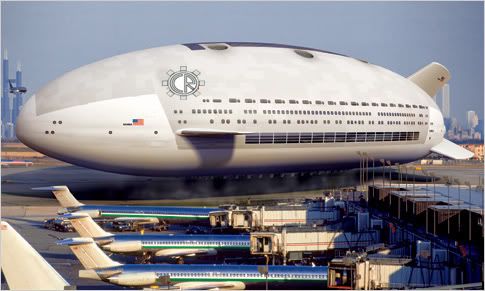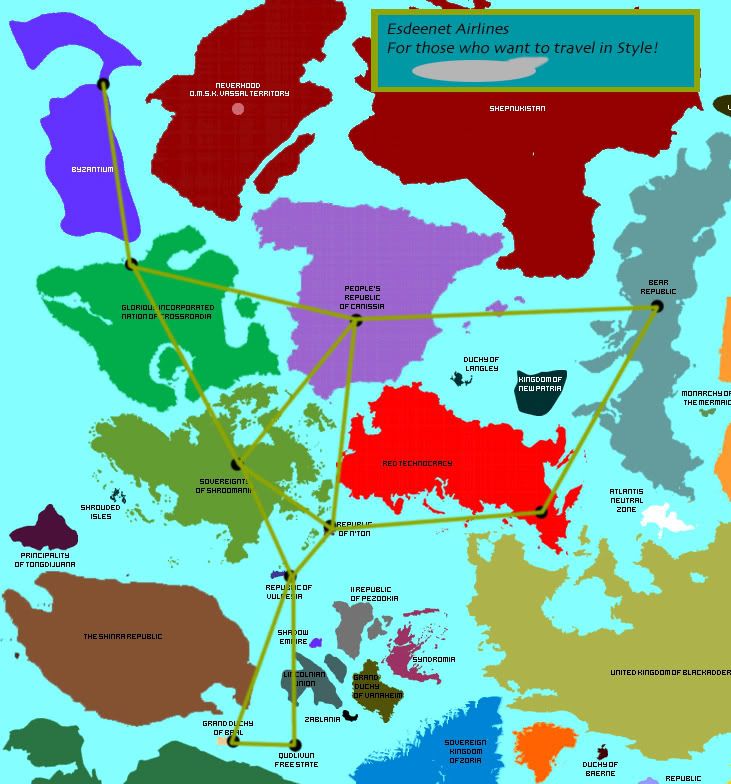Damn! I can't believe I forgot to make that post

PeZookia would like to join the airline project, of course. Funds will be allocated to upgrade our airports in order to acommodate airships in FY2011.
BBC Atlantis News Station
BBC reports: International Conference on Terra Libertia begins
As the short opening ceremony ended, the international conference called by King Paul I of PeZookia could begin in earnest. In an opening speech, King Paul stated that concrete goals must be stated for the Libertopian stabilization plan. More importantly, all major alliances should delineate their desires and goals, including their desire to support any particular Libertopian country.
"It must be understood: There are nations who would like to see their chosen Libertopian leader to prevail. This is not necessarily a bad thing, although in order to devise a proper stabilization plan, we need to understand each other and work with transparency. An economic stabilization plan is not inherently opposed to other plans, but all concepts will fail unless undertaken with full understanding of what other nations and alliances want to accomplish there. I don't think anybody wants to engage in proxy wars in Libertia, but I'm sure that everybody has their own concept on what to do there. Let's hear them all, discuss and come to a proper agreement before this land, and its people, are forever lost."
King Paul has further commented that he believed it is economic stabilization that Libertia needs most, and infighting between the three local nations should be strongly discouraged.
----------------------------------------------------------------------------
The Atlantis Bureau Of Publication has released the following report before the conference began, the hope it will allow various national leaders to make a more informed decision on Terra Libertia:
Preliminary report on Libertopian stabilization
The II Republic RIS, in co-operation with economic ministries of the FUN, has prepared a study of Libertopian economy and political dynamic, and has prepared a preliminary proposal for stabilization using economic means and aid. This document is classified at this time ; It has been sent to all countries concerned with possible means of stabilizing Libertopia.
 Map of Terra Libertia
Table of contents
Section A: Economic situation by warlord areas
Map of Terra Libertia
Table of contents
Section A: Economic situation by warlord areas
A.0: General observations
A.1: Lord Ramsley
A.2: General Alexander
Section B: Law enforcement
B.0: General observations
B.1: Banditry
B.2: Civil Law
B.3: Corruption
Section A: Economic situation by warlord areas
A.0: General observations
It is difficult to estimate macroeconomic indicators in Libertopia due to lack of any data gathering institutions. However, based on observation and reports by humanitarian workers, we estimate that Libertopia is home to between 7 and 10 million people,most of whom live a subsistence lifestyle farming.
Electrical power is practically non-existent. After the collapse of government authority, qualified specialists and engineers either fled the country or died in the subsequent civil war. Power stations and distribution infrastructure was almost completely destroyed by numerous warring factions.
Diesel fuel and generators are available only in the biggest towns and cities.
Most power generation is done by using converted automobiles, and used to support militia operations in one form or another.
Monetary systems don't exist. The Libertopian economy is mostly barter-based, with the most precious items being food, fuel and medical supplies. Taxes are collected "in nature", in the form of food or supplies.
The road system is mostly in a decent state, although most roads require extensive repairs. All major cities are connected by paved roads, and a well-developed local road system exists.
Public education is non-existent. Some reports have surfaced that Red Technocracy volunteers have attempted ot establish a university in territorry of Lord Ramsley, but a shortage of qualified staff is going to be a major problem.
A.1: Lord Ramsley
The coastal areas administered by the "Sons Of The Faith" house close to 40% of Libertopia's population. Due to the extensive coastline and good fishing areas, there is no shortage of food and starvation is relatively rare.
Lord Ramsley operates a large fleet of small fishing cutters, many of them powered by sails due to a shortage of fuel. These ships are forbidden from selling their produce, and it is distributed centrally by the militia. The distribution network is inefficient and proneto corruption, but manages to feed the population when suplemented by small-time farming.
The lack of diesel fuel rules the life in Ramsley's territorries: no power is available to heat homes and light them. The only vehicles are run by the militia, and most labor is done by hand.
Nearly all employment is related in some way to Ramsley's operations. There is a small service industry in the cities, which serves the militia as well.
Lord Ramsley's biggest economic concerns currently are a
lack of diesel fuel and
electrical power.
A.2: General Alexander
The mountains of Libertopia are minerally-rich, but lacks fertile lands. The Iron General controls the smallest population of all the warlords (no more than 10%), and controls most of Libertopia's remaining mines.
The Iron General's lands are well-developed industrially, relatively speaking. He uses legacy machinery, and controls several oil wells capable of running much of his mechanized equipment. Electrical power is most prevalent in Alexander's territorry: His is the only place where Libertopians can power their homes for a few hours a day, although the coverage is uneven and often broken.
Paradoxally, Alexander is often forced to trade with semi-independent local commanders of Ramsley's militia for food and necessary supplies.He only controls one small sea port, and has tenouous ties with other world nations - mostly the IRT, which has been ruthlessly exploiting the mineral wealth present in his lands. The road network in Alexander's territory is dilapidated and scarce, with many roads having been destroyed in the fighting or mined to protect from incursions by the Sultan or Lord Ramsley. Disease is prevalent, made more severe by malnutrition and atrocious working conditions in the mines.
Most pressing concerns for Alexander, according the best available data, are
food shortages,
medical care,
transportation infrastructure and law enforcement.
A.3: Sultan Ibrahim
Ibrahim controls between 30 and 40% of all Libertopian populace. Hard data is hard to obtain on this warlord: We know he operates a fishing fleet similar to Ramsley's, and has several legacy warships, seized from the government by anarchist "liberators" following the dissolution of government. Currently, the Northern Sultanate is in a state of ideological civil war.
Ibrahim's infrastructure is by far in the worst shape ;
As a result, there are no surviving industries or power plants which can be restored to use. Hospitals and schools were converted to warehouses, administrative buildings or mosques.
However, the Sultan has managed to organize an effective system of supply distribution. Draconian punishment for any corrupt dealings made it possible for food to be distributed quite efficiently, despite shortages.
Health care is a
major concern for the Sultan, as practically all doctors with any degree of knowledge fled to areas controlled by Ramsley and Alexander, and health education was non-existent during the period of hardline Islamic rule. As a result, the infant mortality rate is extremely high (reaching as much as
300 deaths per 1000 live births in some areas). Several easily preventable diseases are a major problem in the Sultan's lands, as well as sanitation and water supplies.
The result is that while law enforcement is draconian and effective, the Sultan is facing discontent from his people. This is by far his most pressing concern, along with the typical food problems.
Section B: Law enforcement
B.0: General observations
Contrary to popular belief, Libertopia is not lawless. All three warlords have imposed their own general code of laws, covering all the basic crimes. The main problem is law
enforcement.
Generally, there is no difference between police forces and militia units. They perform both military and policing duties, with different success rates.
There is no court system, separation of powers or other similar institutions. Generally speaking, militia officers act like governors of their assigned areas, having the authority to solve disputes and give sentences for crimes. Naturally, this leads to rampant corruption - there have been cases of militia officers executing civilians just to seize their posessions for themselves.
Only Lord Ramsley has set up anything approaching a court system, based along religious lines. The clergy serve as advisors to militia officers, and have considerable authority over them. Because of this, law enforcement in Ramsley's territories is marginally more efficient. General Alexander and the Sultan use draconian punishment and a system of trusted officers to establish their law enforcement system, with mixed results.
B.1: Banditry
Banditry is rampant. Often the only way to make a living is for Libertopians to take food and necessities from others.
The most pressing problem for all three warlords is that militia soldiers often rob civilians or desert to form roving, armed bands of bandits. Even the Iron General does not completely control his militia, and there are several mountain regions were smaller warlords have set up their little one or two village fiefdoms
Banditry is mostly handled by providing security to major strongpoints: roads and wilderness areas are not policed at all, or very sparely. Most militias have no capability to actually destroy rogue elements, especially since many rogue "mini-states" are composed of formed militiamen themselves.
B.2: Civil Law
No civil law system exists. Disputes are settled either with the help of militia officers, clergy or through common agreement. This leads to a wide disparity of legal systems, which sometimes varies from village to village. For example, in General Alexander's capital of New Delhi, it is legal for 18-year olds to marry by declaring intent in front of a local militia officer, while no more than 20 kilometers outside the city, the customary law is that the man must "buy" the bride from her parents, and it is impossible to enter a legally binding marriage without this step.
This disparity of civil laws and regulations makes it difficult to trade and move about Terra Libertia, sometimes to the extreme that a trader is unable to move his goods between two close villages.
B.3: Corruption
Corruption is a fact of life in Libertia, and is often tolerated by all three warlords. Most militia soldiers performing administrative duties are not paid at all. For example, tax collectors are expected to provide for themselves first, then for their superiors, then finally for the higher authorities. The situation is practically the same in all three warlord's territories, with the notable exception of General Alexander, who is the only one to undertake a serious effort to fight corruption. The Sultan maintains an effective police force, with draconian punishment for corrupt food-distribution officials, but other parts of living in the Sultanate are just as corrupt as anywhere else.




